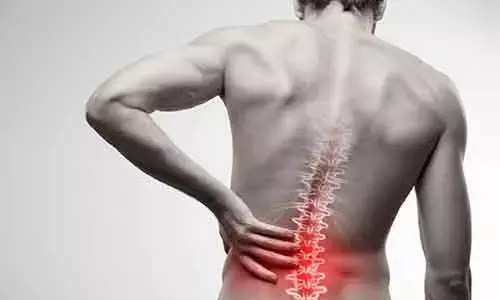- Home
- Medical news & Guidelines
- Anesthesiology
- Cardiology and CTVS
- Critical Care
- Dentistry
- Dermatology
- Diabetes and Endocrinology
- ENT
- Gastroenterology
- Medicine
- Nephrology
- Neurology
- Obstretics-Gynaecology
- Oncology
- Ophthalmology
- Orthopaedics
- Pediatrics-Neonatology
- Psychiatry
- Pulmonology
- Radiology
- Surgery
- Urology
- Laboratory Medicine
- Diet
- Nursing
- Paramedical
- Physiotherapy
- Health news
- Fact Check
- Bone Health Fact Check
- Brain Health Fact Check
- Cancer Related Fact Check
- Child Care Fact Check
- Dental and oral health fact check
- Diabetes and metabolic health fact check
- Diet and Nutrition Fact Check
- Eye and ENT Care Fact Check
- Fitness fact check
- Gut health fact check
- Heart health fact check
- Kidney health fact check
- Medical education fact check
- Men's health fact check
- Respiratory fact check
- Skin and hair care fact check
- Vaccine and Immunization fact check
- Women's health fact check
- AYUSH
- State News
- Andaman and Nicobar Islands
- Andhra Pradesh
- Arunachal Pradesh
- Assam
- Bihar
- Chandigarh
- Chattisgarh
- Dadra and Nagar Haveli
- Daman and Diu
- Delhi
- Goa
- Gujarat
- Haryana
- Himachal Pradesh
- Jammu & Kashmir
- Jharkhand
- Karnataka
- Kerala
- Ladakh
- Lakshadweep
- Madhya Pradesh
- Maharashtra
- Manipur
- Meghalaya
- Mizoram
- Nagaland
- Odisha
- Puducherry
- Punjab
- Rajasthan
- Sikkim
- Tamil Nadu
- Telangana
- Tripura
- Uttar Pradesh
- Uttrakhand
- West Bengal
- Medical Education
- Industry
Muscle relaxants largely ineffective for low back pain

Muscle relaxant drugs are largely ineffective for low back pain, despite being widely prescribed for this condition, suggests an analysis of the latest evidence published by The BMJ today.
The findings show that muscle relaxants might reduce pain in the short term, but the effect is too small to be considered clinically meaningful, and there is an increased risk of side effects.
But the researchers stress that the certainty of evidence is low and say large trials are urgently needed to resolve uncertainties around the use of these drugs for back pain.
Low back pain is a global public health problem and muscle relaxants (a broad class of drugs that include non-benzodiazepine antispasmodics and antispastics) are a commonly prescribed treatment.
For example, in 2020, prescriptions in England exceeded 1.3 million, and in the US more than 30 million. Yet around the world, clinical practice guidelines provide conflicting recommendations for their use.
To address this, researchers in Australia investigated the effectiveness, acceptability, and safety of muscle relaxants compared with placebo, usual care, or no treatment in adults with non-specific low back pain.
They reviewed and carried out a detailed analysis of evidence from 31 randomised controlled trials involving over 6,500 participants, published up to February 2021.
The trials were of varying quality, but the researchers were able to assess the certainty of evidence using the recognised GRADE system.
They set a difference of at least 10 points on a 0 to 100 point scale for pain and disability to be the smallest clinically important effect - a threshold used in other low back pain studies.
Very low certainty evidence showed that non-benzodiazepine antispasmodic drugs might reduce pain intensity at two weeks or less for patients with acute low back pain compared with controls. But this effect is small - less than 8 points on a 0-100 point scale - and does not meet common thresholds to be clinically meaningful.
There was little to no effect of non-benzodiazepine antispasmodics on pain intensity at 3-13 weeks or on disability at all follow-up time points.
Low and very low certainty evidence also showed that non-benzodiazepine antispasmodics might increase the risk of adverse events (commonly, dizziness, drowsiness, headache and nausea) and might have little to no effect on treatment discontinuation compared with controls.
No trials evaluated the effect of muscle relaxants on long term outcomes.
Although this analysis was based on the best available trial evidence, the researchers acknowledge some limitations, and say the modest overall effect could still mean that some, but not all, individuals gain a worthwhile benefit.
However, they stress that the low to very low certainty of evidence does not allow any firm recommendations.
"We would encourage clinicians to discuss this uncertainty in the efficacy and safety of muscle relaxants with patients, sharing information about the possibility for a worthwhile benefit in pain reduction but increased risk of experiencing a non-serious adverse event, to allow them to make informed treatment decisions," they write.
"Large, high quality, placebo controlled trials are urgently needed to resolve uncertainties about the efficacy and safety of muscle relaxants for low back pain," they conclude.
https://www.bmj.com/content/374/bmj.n1446
Hina Zahid Joined Medical Dialogue in 2017 with a passion to work as a Reporter. She coordinates with various national and international journals and association and covers all the stories related to Medical guidelines, Medical Journals, rare medical surgeries as well as all the updates in the medical field. Email: editorial@medicaldialogues.in. Contact no. 011-43720751
Dr Kamal Kant Kohli-MBBS, DTCD- a chest specialist with more than 30 years of practice and a flair for writing clinical articles, Dr Kamal Kant Kohli joined Medical Dialogues as a Chief Editor of Medical News. Besides writing articles, as an editor, he proofreads and verifies all the medical content published on Medical Dialogues including those coming from journals, studies,medical conferences,guidelines etc. Email: drkohli@medicaldialogues.in. Contact no. 011-43720751


